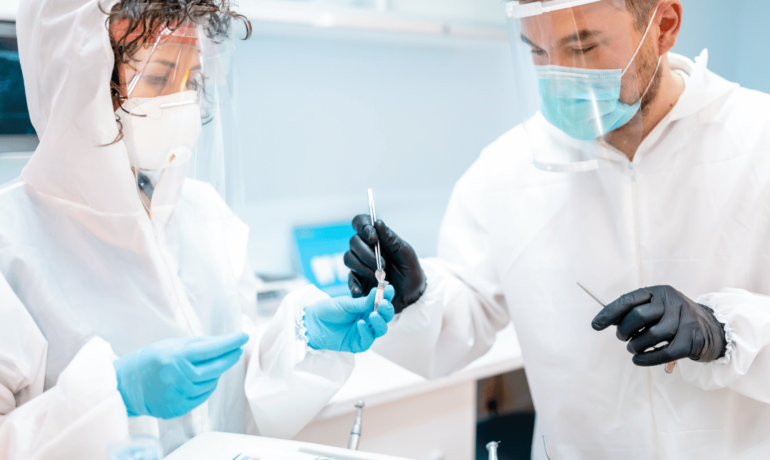You might have heard of a relative or a friend who went to a general physician and was later referred to a cardiologist for a thorough examination. Such a scenario happens even in the dental industry. People come to their dentist in Upland California for a nagging toothache just to be referred to an endodontist.
While it might feel unsettling at first, it’s more beneficial than you think. It’s also not uncommon and is often a positive step and reassuring. For sure, you might have a few questions you wanted to ask your dentist, but you think you’re not in the position to question his authority.
Don’t worry! Your concern is always valid, especially if it has something to do with your oral health. Luckily, in this article we’ll walk you through the reasons for a referral, what to expect at an endodontist appointment, and why this specialist care could make all the difference for your oral health.
Let’s dive in!
General Dentist vs. Endodontist
When your general dentist sends you to an endodontist for some reason, your specialist is basically saying that your dental issue requires more advanced expertise, specialized equipment, or a delicate procedure that goes beyond general dentistry. While a general dentist can perform an endodontic-related procedure such as a root canal, an endodontist would most likely do a better job due to the specialist’s advanced training. To put everything into perspective, let’s compare a general dentist and an endodontist in terms of training.
Dental studies often take eight years to complete: four years to earn a bachelor’s degree and four years to earn a DDS or DMD in dental school. If dentists are interested in specializing, for example, endodontics, they need to complete a dental residency.
A prospective endodontist, for instance, must take and pass the Integrated National Board of Dental Examination administered by the American Dental Association (ADA). Provided that a license was obtained, the dentist will now need to complete a two-year endodontic residency program. In this stage, resident endodontists get clinical and hands-on training in performing complex procedures, such as intricate root canals, retreatments, and surgeries like apicoectomies, which involve the removal of the tooth’s root tip.
The residency period also requires completing an independent research project toward the end of the training. Additionally, endodontists are trained in using advanced technology, such as surgical microscopes and 3D imaging, to enhance precision and outcomes.
A general dentist, on the other hand, focuses on preventive care, routine procedures such as fillings, crowns, and basic root canals, and overall oral health management. General dentists perform about two root canals per week, endodontists do an average of 25 weekly.
What Does an Endodontist Do?
Endodontists are often associated with diagnosing and treating problems involving the dental pulp and root canal. But endodontists do more than besides a root canal. Their expertise extends far beyond that. They also address conditions such as severe tooth pain, dental trauma, abscesses, and infected pulp. But the main responsibility of an endodontist is to preserve natural teeth that might otherwise be lost due to infection, decay, or trauma.
In addition to doing root canals, endodontists offer services like re-doing failed root canals, apicoectomy or removing infected tissue at the root tip, and advanced diagnostics.
Common Reasons for a Referral to an Endodontist
Being referred to an endodontist shouldn’t surprise, or cause you to panic. It’s simply a proactive step that ensures you receive the best possible care. When it comes to certain dental issues that require expertise and precision, following your dentist’s recommendation or referral would be the best option even if it requires you to go to another dental clinic.
That said, below are the most common reasons why your dentist would recommend you to an endodontist:
Complex Root Canal Cases
Generally, the more complex the procedure, the lower the chance of success. For more difficult cases (classified as level III or IV), it is recommended to refer patients to an endodontist or a specialist with advanced training. This assessment not only helps gauge the difficulty of a root canal but also provides a solid basis for referrals, supporting a well-structured referral system for managing complex dental issues.
With specialized instruments like surgical microscopes, they can navigate even the most complex root structures with precision.
Persistent Tooth Pain
When tooth pain persists despite standard treatments like fillings or basic root canal therapy, it may indicate an underlying issue that requires advanced diagnosis. Fractures or infections can hide within the tooth, in which general dentists might not always fully diagnose.
Deep Tooth Decay Near the Nerve
In cases where decay has progressed deep into the tooth, approaching or invading the pulp, an endodontist can remove the decay and treat the affected pulp, without compromising the tooth’s structural integrity.
Tooth Injuries and Trauma
One of the main responsibilities of an endodontist is to ensure that the damaged tooth can be preserved whenever possible. In the event of a trauma or accident, cracked, chipped, or dislodged teeth not only need prompt care but also precise and meticulous treatment execution to save tooth structure.
As mentioned, not only do endodontists possess the required skills and training to identify complex tooth issues, but they also use cutting-edge technology, such as 3D imaging and digital radiography, to deliver the most accurate diagnoses and effective treatments.
Trusting Your Dentist in Upland CA
If you have concerns about your treatment or the referral, don’t hesitate to consult our dentist at Upland Dental Practice. We are here to answer your questions, ease your worries, and ensure you feel confident in your treatment plan. Remember, this process is designed to protect your oral health and preserve your smile for years to come. By visiting our office, you benefit from a collaborative approach where both your general dentist and our specialist work together to deliver optimal care.


